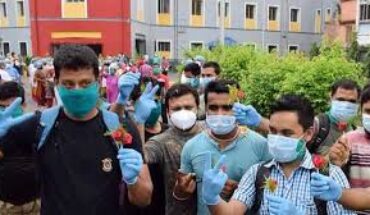Chapal Mehra believes accountability, transparency and countering misinformation may help,Over the last year, as the novel coronavirus has plagued humanity killing thousands, the role of science and particularly vaccines has become critical. To millions, vaccines represent the possibility of a swift end to an uncontrollable pandemic. It is not surprising then that recent news of promising vaccines has been greeted with hope and faith.
In India, however, lack of transparency and public information as well as the government’s seeming high-handedness have started creating a distrustful narrative around the two vaccine candidates. The accelerated approval of Covaxin without Phase III trials data puts forth several critical questions. Why are approvals shrouded in mystery? Has the scientific process and validation been followed rigorously before approval? Most importantly, why has there been no open discussion and comprehensive public education about the vaccines?
The role of the vaccine in putting an end to this pandemic is critical. Yet public trust in such vaccines is indispensable. In short, a vaccine-led control effort will only be as effective as the public confidence and support it garners. However, as experts and politicians engage in public sparring, the general public’s fear and scepticism around these vaccines is only growing. This underscores the urgent need and critical importance of transparency as also public education and participation in this process.
For the public, there exist multiple concerns around any large-scale vaccination programme. A vast majority of these concerns are fuelled by a lack of trust in approval processes, insufficient information combined with limited health literacy and a poor understanding of the protection vaccines provide. These concerns are exacerbated when you couple them with the fact that trust in public institutions has been quite low, especially in the wake of the lockdowns and economic desperation. So, the expectation that populations will accept a vaccine blindly and flock to government programmes to take it is misguided.
How do we remedy this? The government and public institutions need to start by building open, participative frameworks for building trust, and engaging and informing all stakeholders, especially experts and communities, on these vaccines. This should have started months ago but even now it is not late. For building trust, a national forum needs to be created. It should include representatives from all stakeholders, where both the scientific basis for approval and the roll-out strategy need to be discussed. Until this is done, public confidence will remain low.
Simultaneously, there needs to be public education and information through large-scale State- and local-level networks where people are informed, sensitised and their feedback taken. These efforts need to be guided by scientific experts, communication and community specialists and leaders. This is important because misinformation about the vaccines is rife. This is potentially damaging for any mass vaccination programme.
The people who need to take this vaccine need to understand the programme, be assured of the vaccine’s efficacy but also be involved in decision-making. Local leaders from public figures to religious leaders need to be made Ambassadors in this process. Local networks from self-help to faith groups, the media and even educational institutions need to participate to help citizens understand its importance and build trust. It is important that the process is not just directive but participative with people being able to ask questions and offer suggestions.
It is instructive to note that this will be the largest immunisation exercise to be rolled out globally. Yet, in India we still have no idea what the roll-out and access strategy is. This is why an accountable, open, ground-up participative model needs to be implemented. This conversation should be led by experts, local and community leaders, not political leaders. In fact, using vaccines for political gains and image building, though not unexpected, will not only be unethical but counterproductive.
Governments everywhere need to understand that a simple, democratic, yet effective way of improving uptake while reducing costs is by creating participatory frameworks of engaging experts and communities and building effective and reliable public information, and transparency.
Science has done its job. Now it is time for the government’s to do what is expected in a democracy – be accountable, build trust and counter misinformation with openness and communication and not obfuscation.Chapal Mehra is Public Health Specialist and Director, Pi Consulting. Views expressed are his own
In India, however, lack of transparency and public information as well as the government’s seeming high-handedness have started creating a distrustful narrative around the two vaccine candidates. The accelerated approval of Covaxin without Phase III trials data puts forth several critical questions. Why are approvals shrouded in mystery? Has the scientific process and validation been followed rigorously before approval? Most importantly, why has there been no open discussion and comprehensive public education about the vaccines?
The role of the vaccine in putting an end to this pandemic is critical. Yet public trust in such vaccines is indispensable. In short, a vaccine-led control effort will only be as effective as the public confidence and support it garners. However, as experts and politicians engage in public sparring, the general public’s fear and scepticism around these vaccines is only growing. This underscores the urgent need and critical importance of transparency as also public education and participation in this process.
For the public, there exist multiple concerns around any large-scale vaccination programme. A vast majority of these concerns are fuelled by a lack of trust in approval processes, insufficient information combined with limited health literacy and a poor understanding of the protection vaccines provide. These concerns are exacerbated when you couple them with the fact that trust in public institutions has been quite low, especially in the wake of the lockdowns and economic desperation. So, the expectation that populations will accept a vaccine blindly and flock to government programmes to take it is misguided.
How do we remedy this? The government and public institutions need to start by building open, participative frameworks for building trust, and engaging and informing all stakeholders, especially experts and communities, on these vaccines. This should have started months ago but even now it is not late. For building trust, a national forum needs to be created. It should include representatives from all stakeholders, where both the scientific basis for approval and the roll-out strategy need to be discussed. Until this is done, public confidence will remain low.
Simultaneously, there needs to be public education and information through large-scale State- and local-level networks where people are informed, sensitised and their feedback taken. These efforts need to be guided by scientific experts, communication and community specialists and leaders. This is important because misinformation about the vaccines is rife. This is potentially damaging for any mass vaccination programme.
The people who need to take this vaccine need to understand the programme, be assured of the vaccine’s efficacy but also be involved in decision-making. Local leaders from public figures to religious leaders need to be made Ambassadors in this process. Local networks from self-help to faith groups, the media and even educational institutions need to participate to help citizens understand its importance and build trust. It is important that the process is not just directive but participative with people being able to ask questions and offer suggestions.
It is instructive to note that this will be the largest immunisation exercise to be rolled out globally. Yet, in India we still have no idea what the roll-out and access strategy is. This is why an accountable, open, ground-up participative model needs to be implemented. This conversation should be led by experts, local and community leaders, not political leaders. In fact, using vaccines for political gains and image building, though not unexpected, will not only be unethical but counterproductive.
Governments everywhere need to understand that a simple, democratic, yet effective way of improving uptake while reducing costs is by creating participatory frameworks of engaging experts and communities and building effective and reliable public information, and transparency.
Science has done its job. Now it is time for the government’s to do what is expected in a democracy – be accountable, build trust and counter misinformation with openness and communication and not obfuscation.Chapal Mehra is Public Health Specialist and Director, Pi Consulting. Views expressed are his own





